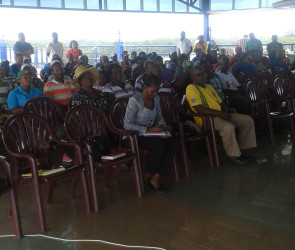Minister of Agriculture Noel Holder on Monday recommissioned the Tapa-kuma Cassava Processing Factory.
In 2004, the village had benefited from the $3.378M refurbished facility through a collaboration with IFAD, IICA and the village council.
Also present were the Regional Chairman Devanand Ramdatt, the OAS country representative, representatives of IICA’s Guyana office and the Permanent Secretary of the Ministry, George Jervis among others.
In his remarks to the gathering, Holder said that the import of the processing plant was two-fold, its recommissioning and also the potential impact it could have in generating wealth at the village level by adding value through cassava processing.

“Today’s event is a step in the right direction as the Ministry of Agriculture with support from our development partner IICA, will be pushing ahead with our work programme of further expanding the local cassava industry. By resuscitating the cassava industry, we will be working to improve the social and economic welfare of Tapa-kuma Village”, he said.
He added that the government is cognisant of the fact that there remain a number of constraints which need to be appropriately addressed if the industry is to move from a subsistence level to an actual industry.
“The goal of the Ministry of Agriculture is to support the production of cassava to meet increasing demands outside of its traditional users. Increasingly, cassava products namely farine, casareep and cassava bread are becoming important parts of the Guyana Market. The recommissioning of this factory will see villagers meeting an increasing demand for such products.”
Holder later met with Pomeroon farmers in Charity where he had an opportunity to listen to their grievances. Also present at that meeting was CEO of NAREI, Oudho Homenauth and other representatives of the Agriculture Ministry.
Several issues surrounding the coconut industry were highlighted, of particular mention was the disease caused by the red palm mite affecting coconut palms in the Pomeroon River – the trees bear fewer coconuts and the leaves fall off. Holder promised the farmers that a team from the National Agricultural Research and Extension Institute (NAREI) will be in the Pomeroon to distribute free chemicals to those affected along with experts to advise them.
Farmers also complained about poor drainage and a scarcity of markets for the coconuts. According to one, “We need assistance from the government to boost the coconut industry so that means we would also like to have chemicals at subsidised prices. Some of the farms in the Pomeroon need to be rehabilitated in order to be kept clean. If we get steady visits from the Ministry we will be able to do better because they will tell us where we are going wrong and it will be corrected and most importantly we need to see tangible markets for the produce”.
Holder reiterated the importance of the industry in Guyana and reassured the farmers that the administration wants to see the restoration of coconut production, since it is the major non-traditional crop in Guyana.
Advising that they will be instructed as to what steps will be taken since the problems have to be managed in an integrated manner, he promised to revisit the famers in the near future.








